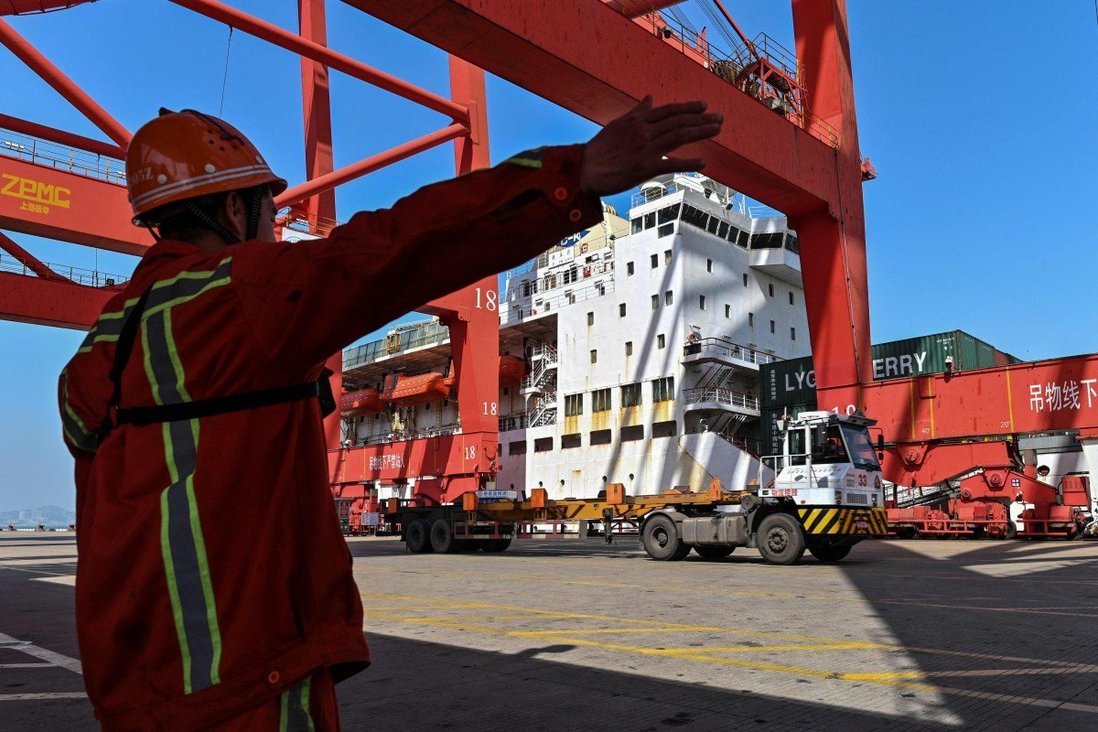www.aljazeerah.info
Opinion Editorials, April 2021
Archives
Mission & Name
Conflict Terminology
Editorials
Gaza Holocaust
Gulf War
Isdood
Islam
News
News Photos
Opinion Editorials
US Foreign Policy (Dr. El-Najjar's Articles)
www.aljazeerah.info
Booming US Economy Is Good News for Emerging Asia's Exporters, But Not So Much for Asian Equities By Sylvia Sheng April 16, 2020 |
 |
 |
|
|
A worker gestures while a crane prepares to load a container
onto a truck in Lianyungang, Jiangsu province on March 24. China’s exports rose in March as demand picked up in key overseas markets, including the US. |
US data in March reflects an economic turnaround that is likely to persist, given the strong fiscal and monetary support and rising vaccination rate Emerging Asia will benefit from the rise in US demand, but expect the higher US yields and a stronger dollar to put pressure on the stock markets
The pace of America’s economic recovery is picking up. Recent US data points to a surge in economic activities in March, following some weather-related weakness in February. Meanwhile, US business survey results are going from strength to strength.
In particular, the ISM manufacturing PMI rose to its highest level since 1983, while the ISM services PMI hit an all-time high in March. US labour market conditions also improved notably, with almost a million new jobs created in March, much stronger than the average increase of 132,000 in the previous three months.
This resurgent momentum in the US economy should persist until at least the end of this year, powered by several strong tailwinds. First, the US is leading many major economies in its vaccination roll-out – more than a third of the US population has already received their first dose. The rapid vaccine roll-out has notably brought down daily new infections since the start of the year and is likely to facilitate further economic reopening and the normalisation of service consumption.
Second, monetary policy is likely to remain accommodative, bolstering the recovery. Despite the very strong economic data recently, US Federal Reserve chairman Jerome Powell reiterated the central bank’s commitment to a dovish policy stance last week.
At the same time, the US government is pumping an exceptionally large amount of fiscal support into the economy. The US Congress passed a US$1.9 trillion coronavirus relief package (8 per cent of gross domestic product) last month, in addition to the US$900 billion one passed in December. This new package will provide a huge boost to household income, with a new round of stimulus cheques of up to US$1,400 per eligible person on top of the US$600 sent out in early January. This comes at a time when the US household savings rate is already elevated, as a result of the pandemic relief packages introduced last year. The fiscal largesse has prompted many to upgrade their US GDP growth forecast, with the Fed’s projection for 2021 revised up, to 6.5 per cent in its March report, compared to 4.2 per cent in December. And this does not take into account the US$2.3 trillion infrastructure proposal that was unveiled by President Joe Biden this month.
What does a booming US economy mean for emerging Asia? From a trade perspective, export-oriented emerging Asian economies should benefit from the improvement in US demand.
EVERY SATURDAY SCMP Global Impact Newsletter By submitting, you consent to receiving marketing emails from SCMP. If you don't want these, tick here By registering, you agree to our T&C and Privacy Policy Exports from across emerging markets in Asia, led by North Asian economies, have already rebounded rapidly since mid-2020, helped by the external demand recovery. Both China and Taiwan’s exports rose by around 30 per cent year on year in March, led by strong shipments to the US.
Emerging Asia is well positioned to benefit from the strength in US demand, as we are not seeing much tangible evidence of deglobalisation. Global exports have moved in line with industrial production. US imports as a share of the economy held steady, indicating there was not much import substitution.
Moreover, there are no obvious signs of supply chains shifting out of China during the pandemic. In fact, China’s share of the global imports market increased by 1.2 percentage points and its share of the US import market rose by 3.1 percentage points at the end of 2020, compared to the end of 2019.
On the other hand, higher US yields and a stronger dollar, as a result of strong US growth, could pose challenges for emerging markets in Asia. The US 10-year government bond yield has already risen sharply from below 1 per cent at the start of the year to around 1.6-1.7 per cent currently.
Rising US bond yields could force central banks in Asia to tighten early, as pressure from higher US yields is likely to be compounded in the presence of external vulnerabilities. However, most regional economies are displaying greater external stability now than during the taper tantrum episode of 2013, mitigating the risk of disruptive tightening.
That said, higher US yields are likely to be more of a concern for emerging Asia’s equity markets, which are heavily exposed to growth-style equities, which tend to underperform the global stock market when rising bond yields drive rotation from growth to value-style equities.
Emerging market equities in Asia are also likely to be further constrained by a strong US dollar. We have already seen this dynamic playing out to some extent, with these equities lagging behind other major markets so far this year amid rising US yields.
All in all, a booming US economy is likely to be more positive for emerging Asia’s economies than its equities.
***
Sylvia Sheng, vice president, is a global strategist on the multi-asset solutions team, responsible for communicating the group's economic and asset allocation strategy, based in Hong Kong. Prior to joining J.P. Morgan, she worked as a China and Asia economist at Bank of America Merrill Lynch. She has a PhD in economics from the University of Cambridge and an MPhil and BA in economics from the same university.
***
Share the link of this article with your facebook friends
|
|
|
|
||
|
||||||


